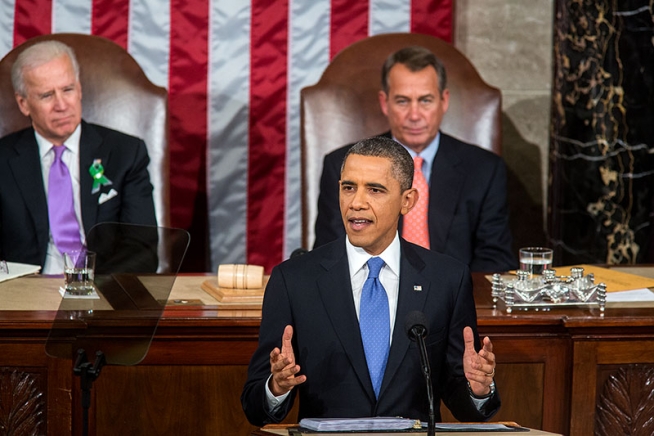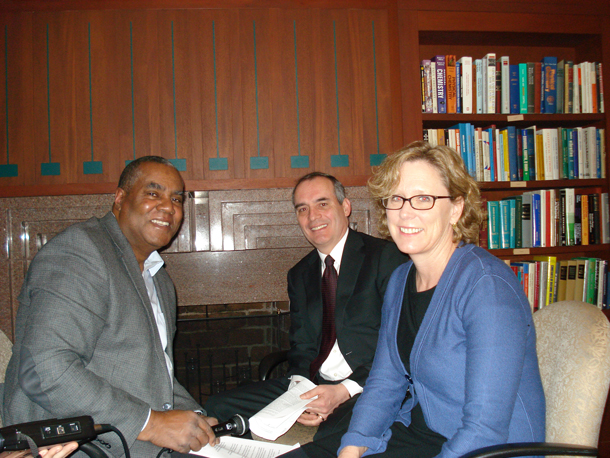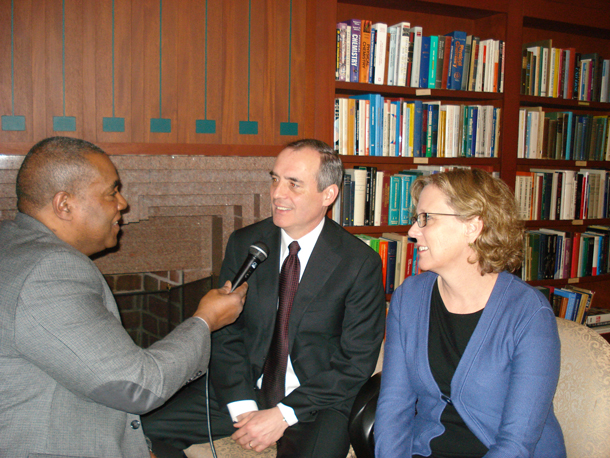Obama Doubles Down on Climate Action
Air Date: Week of February 15, 2013

President Barack Obama delivers the State of the Union address at the U.S. Capitol in Washington, D.C., Feb. 12, 2013. (Official White House Photo by Chuck Kennedy)
In the State of the Union address, President Obama called climate change a clear and present danger, promising executive action if Congress won't pass legislation. Host Steve Curwood discusses the second term environmental agenda with Ann Carlson of the Emmett Center on Climate Change at the UCLA School of Law, and Kevin Knobloch of the Union of Concerned Scientists.
Transcript
CURWOOD: From the Jennifer and Ted Stanley Studios in Boston, this is Living on Earth. I'm Steve Curwood. 2013 could launch the era of climate action for the Obama administration, if we're to take the rhetoric seriously. In January, as the President stood on the steps of the Capitol to be sworn in for a second term, he put the climate challenge front and center. And most recently in his State of the Union address the President laid out more details - and connected the dangers of climate instability to recent extreme weather.
OBAMA: It’s true that no single event makes a trend. But the fact is, the 12 hottest years on record have all come in the last 15. Heat waves, droughts, wildfires, floods - all are now more frequent and more intense. We can choose to believe that Superstorm Sandy, and the most severe drought in decades, and the worst wildfires some states have ever seen were all just a freak coincidence. Or we can choose to believe in the overwhelming judgment of science - and act before it’s too late. [APPLAUSE]
CURWOOD: We turned to two seasoned observers of science and climate policy for some perspective. Environmental Law professor Ann Carlson is a co-director at the Emmett Center on Climate Change at UCLA, and first here's Kevin Knobloch; he’s President of the Union of Concerned Scientists.

Left to right: Steve Curwood, Kevin Knobloch, and Ann Carlson (Photo: Helen Palmer)
KNOBLOCH: What he's doing in talking about the impacts is connecting to the millions of Americans who now experience climate impacts and the costly destruction of climate impacts. You know if you’re a gardener or a hiker, carpenter who works outdoors you already are observing and connecting the dots between climate influenced weather events and climate change. And so the President is simply tapping into that and reminding many other Americans that this thing is real.
CURWOOD: So the president says this is happening, he says the people see that this is happening...realistically is any chance of Congress getting together and saying that this is happening and that action should happen now based on the science?
KNOBLOCH: I thought it was a brilliant stroke that the president called on Congress and cited Senator John McCain and Senator Joe Lieberman’s earlier work in trying to move a comprehensive climate bill through the Congress. Because it is the Congress’s responsibility to respond to an urgent problem like this. He then said, ‘if Congress won’t act, I will.’
CURWOOD: Professor Carlson, you're a lawyer who looks closely at environmental law. So tell us, what can the President do on his own if the Congress doesn't act?
CARLSON: The most expansive power he has is under the Clean Air Act, and he’s used that in two respects. One, to ratchet up fuel efficiency standards to really quite dramatic levels going forward, and the second thing he's doing is he's issuing regulations that are actually required under a court decision called Massachusetts vs. EPA to regulate greenhouse gas emissions from new and existing coal-fired power plants and other utilities. He’s also got power to, for example, use his procurement power to have his agencies purchasing green vehicles, to get the Defense Department, as it already has, focused on the development of renewable power. He’s done a fair amount on federal lands in getting the siting of renewable facilities to produce renewable energy through more quickly. So he’s not only already done a lot, but continues to have a fair amount of power.
CURWOOD: I noted that in his speech he certainly suggested he would continue to push renewable energy to keep up with China among other things. Is there enough energy in the renewable energy program the President has laid out so far, Kevin Knobloch?
KNOBLOCH: Yes; here's the interesting thing about what's happening with renewable energy in this country. Not only is it growing rapidly, but it’s driving manufacturing growth - American manufacturing growth. So in 2005 the percentage of wind towers, turbines, gearboxes installed in this country - made in this country - was 35 percent. Today it’s 70 percent. So through the deep recession this is one of the few growing areas of American manufacturing - and that has everything to do with state policies and federal policies and investments to drive renewable energy.
CARLSON: So here's a place where Congress has cooperated with the president - although on a short-term basis - is in passing and extending the production tax credit which really is one of the reasons why renewable energy has continued to grow throughout the recession. One of the things that the President is trying to do in his State of Union and speaking directly Congress is to suggest that there may be areas where Congress can agree with the president - on ways to stimulate new energy innovation, potentially to stimulate research and development, without actually tackling the larger question of an overall national climate policy.
CURWOOD: Now elsewhere in this speech he says he plans to cut red tape and speed up oil and gas permits. So do you see that as an olive branch maybe to the fossil fuel industry or heartland Democrats?
CARLSON: I think Obama's energy policy all along has been to focus heavily on domestic energy sources, not always renewable ones, and I think some of that is political; I think some of it is economic reality. There is a huge boom in the drilling of natural gas and I think it's something that no president can ignore. Natural gas prices have fallen really dramatically, and trying to encourage that has a couple of consequences - one of which is positive in the short run for climate change - and that is that natural gas is displacing coal which is a much more carbon intensive fuel than natural gas. And so in the short term that's really led to a reduction in emissions and that’s not a bad thing to encourage. In the long run, if we really do accomplish the kinds of climate goals that scientists believe are necessary to significantly reduce greenhouse gas emissions, we’re going to have to move away from natural gas as well - or figure out how to do something with emissions that natural gas and coal generate by sequestering them into the ground or something that doesn't release them into the atmosphere.
KNOBLOCH: The low price of natural gas is also creating some competition and stress for cleaner renewable energy and we have to be mindful about that.
CURWOOD: The President’s plan, though, to speed up oil and gas permits; does it raise any red flags, Kevin Knobloch? Does it say anything about the approval of the Keystone XL pipeline, for example?

Living on Earth Host Steve Curwood in conversation with Kevin Knobloch and Ann Carlson (Photo: Helen Palmer)
KNOBLOCH: The Keystone XL pipeline, which would transport dirty oil from the so-called tar sands sites up in Canada through the vertical length of this country down to our export ports in Texas, really has become an emblem among people worried about climate change, in great part because we don't have a coverage policy this country, a declining cap on carbon and other heat trapping emissions within which to consider these projects. So what’s happening now, whether it’s this proposed pipeline or efforts to open up coal export ports in the state of Washington is that the people across the country who worry about climate change - the pace of change and the role of fossil fuels driving and accelerating it, stepping up and opposing these projects. Our sense is that we need to get a comprehensive policy in place; it rapidly drives down greenhouse gas emissions and gives us a fighting chance to hold off catastrophic changes. Until then, it is likely to be a pitched battle over every major pipeline or coal export and becomes a symbol of turning a blind eye to what the burning of fossil fuels is doing to the ability of this planet to sustain life.
CURWOOD: Professor?
CARLSON: So I think the Keystone XL question raises a really important question that is mostly avoided in the State of Union, but I think we’re really going to need to focus on as well, and that is that the United States can't go at it alone on reducing greenhouse gas emissions. And as we do things like focus on domestic natural gas, the rest of the world is still heavily dependent on coal, and in fact, things like ports that Kevin mentioned to export coal simply mean that we could shift a lot of the emissions away from the domestic economy and to the global economy - and one of the problems of that is overall greenhouse gas missions aren’t reduced. So one of the really interesting and important questions will be the degree to which Secretary of State Kerry, for example, makes the goal of reducing international global admissions central to his mission diplomatically.
CURWOOD: So the president proposed to use federal oil and gas revenues to fund what he calls an energy security trust, and he said that this would drive research and shift our cars and trucks off of oil for good. Let’s hear a bit of that tape.
OBAMA: Tonight I propose we use some of our and gas revenues to fund an energy security trust that will drive new research and technology to shift our cars and trucks off oil for good. If a nonpartisan coalition of CEOs and retired generals and admirals can get behind this idea, then so can we. Let’s take their advise and free their families and businesses from the painful spikes in gas prices we put up with for far too long.
KNOBLOCH: It's a powerful vision. It’s really the kind of presidential leadership that you look to a president for, to set an ambitious long-term vision that helps solve a range of problems. The trust fund is an intriguing idea; it would create revenues for research on hydrogen fuel cells and battery electric vehicles along with low-carbon biofuels and so on. It’s a little bit of a mixed signal to draw the revenues from oil and gas drilling on public lands. But there may actually be an exquisite partnership there.
CARLSON: I think one of the things that might be a place where you can get bipartisan agreement is to fund research into technology and innovation. That seems to be less controversial than, for example, regulating carbon emissions or putting a price on carbon by imposing either a tax or a cap and trade scheme. So I think this is a place where maybe he can get some bipartisan agreement. I don’t know whether he’ll get it out of those particular revenues. I would also add that I think the push to move our automobile fleet away from conventional gasoline and to electricity and to other fuels that do not emit carbon is an absolutely necessary move if we are to reduce our carbon emissions in the way that scientists think we need to in the course of the next 30 or 40 years. It's a long-term strategy, but it’s a strategy we got to begin now.
CURWOOD: The President, to do all this, needs a team. Most of his green team has left - the Secretary of Energy is moving on, the Secretary of the Interior, the administrator of the EPA, the leader of the National Oceanic and Atmospheric Administration - all these folks have left the administration. Why do you think such turnover in the green team for the President if he's making such a new commitment here?
CARLSON: The turnover to me seems to be just the natural result of having served for four years, a very intense four years, and not in any way a statement about whether the people who are leaving have a commitment to the President's agenda going forward. And I trust that he will find equally impressive replacements for all those very talented and extremely qualified public servants. So it doesn't concern me there’s turnover, it just seems like a natural turnover at the end of a first term.
CURWOOD: Quick last comment on new administration member John Kerry, Secretary of State...the XL pipeline decision first goes through the Department of State. As a senator, John Kerry sponsored really strong legislation - it didn’t pass - on climate. How do you think having Mr. Kerry at State is going to effect something like the pipeline decision, Kevin Knobloch?
KNOBLOCH: There's been no stronger leader on climate action in the Congress than Senator Kerry. I think we should have every reason to expect him to bring that leadership into his role as Secretary of State. The most important thing is that the Environmental Impact Assessment that the State Department is conducting on the Keystone Pipeline take into account climate change and climate impacts. Any serious environmental assessment of climate impacts of this pipeline will show that it would have very significant harm.
CARLSON: The only thing I would add is that the Secretary of State is going to play a key role in upcoming negotiations to try to extend the Kyoto protocol and to get the international community really committed to reducing greenhouse gas emissions. And I think the signal it sends is to have somebody who is such a strong senator on climate now leading the State Department is really, really important and he's got an opportunity here to signal to the rest of the world that the United States is serious about reducing its own admissions and to getting the global community to follow suit.
CURWOOD: Kevin Knobloch is President of the Union of Concern Scientists, Ann Carlson is a Professor of Environmental Law at UCLA. Thank you both.
CARLSON: Thank you so much.
KNOBLOCH: Thank you, Steve.
Links
Living on Earth wants to hear from you!
Living on Earth
62 Calef Highway, Suite 212
Lee, NH 03861
Telephone: 617-287-4121
E-mail: comments@loe.org
Newsletter [Click here]
Donate to Living on Earth!
Living on Earth is an independent media program and relies entirely on contributions from listeners and institutions supporting public service. Please donate now to preserve an independent environmental voice.
NewsletterLiving on Earth offers a weekly delivery of the show's rundown to your mailbox. Sign up for our newsletter today!
 Sailors For The Sea: Be the change you want to sea.
Sailors For The Sea: Be the change you want to sea.
 The Grantham Foundation for the Protection of the Environment: Committed to protecting and improving the health of the global environment.
The Grantham Foundation for the Protection of the Environment: Committed to protecting and improving the health of the global environment.
 Contribute to Living on Earth and receive, as our gift to you, an archival print of one of Mark Seth Lender's extraordinary wildlife photographs. Follow the link to see Mark's current collection of photographs.
Contribute to Living on Earth and receive, as our gift to you, an archival print of one of Mark Seth Lender's extraordinary wildlife photographs. Follow the link to see Mark's current collection of photographs.
 Buy a signed copy of Mark Seth Lender's book Smeagull the Seagull & support Living on Earth
Buy a signed copy of Mark Seth Lender's book Smeagull the Seagull & support Living on Earth

